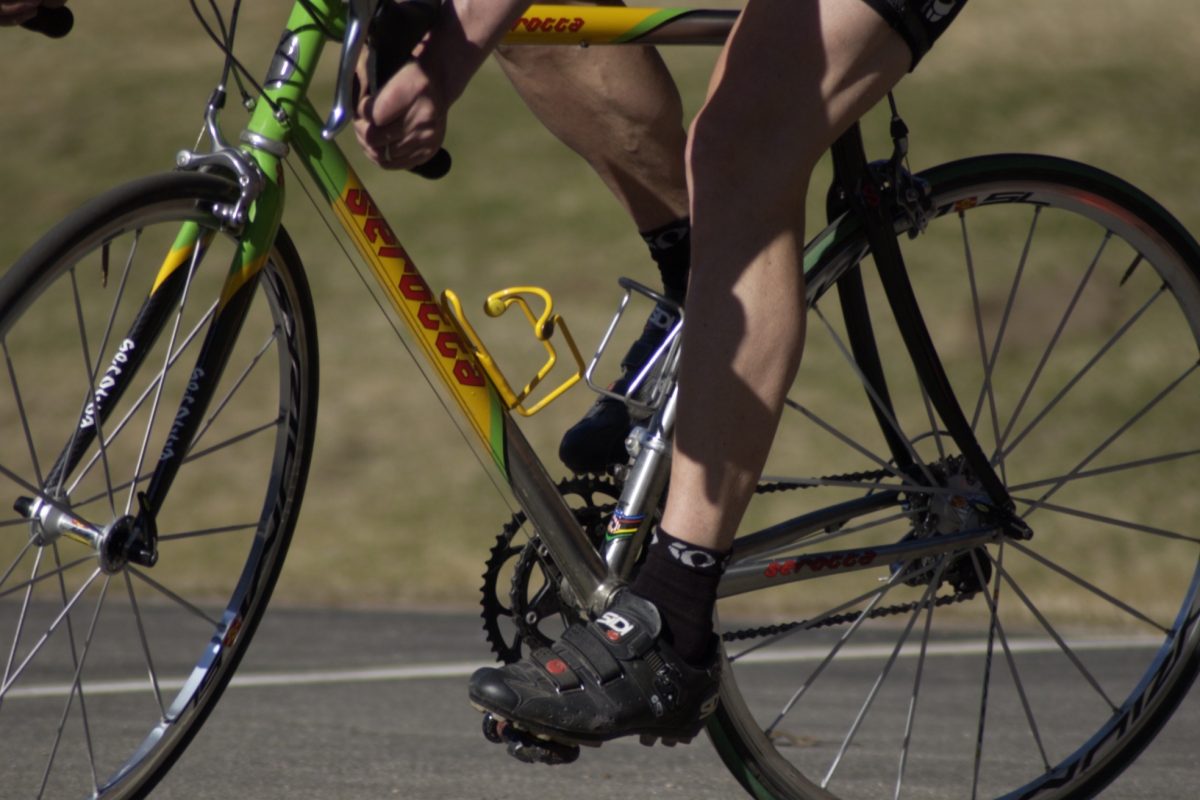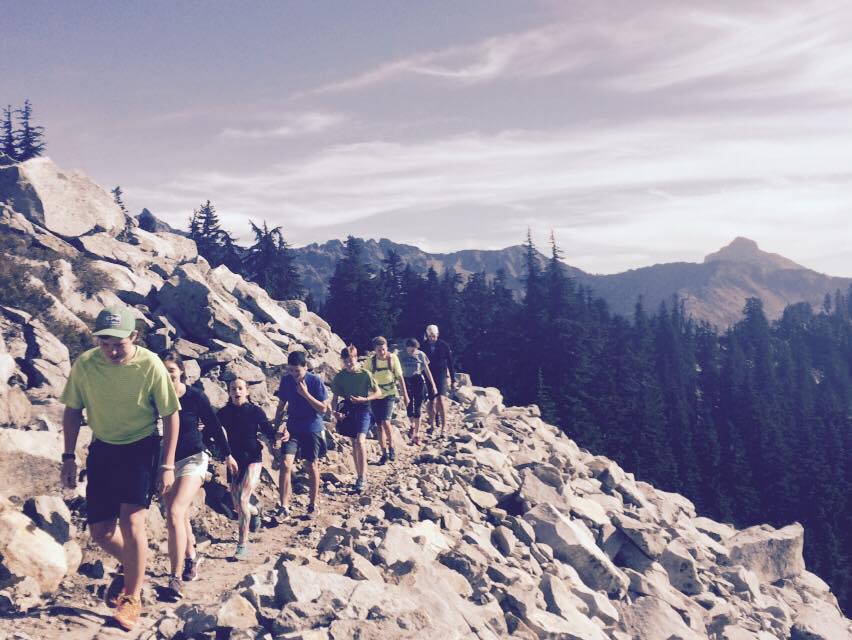** Editors note: This will be a weekly column highlighting our ski coaches from around the country… including elite coaches, college coaches, high school coaches, volunteer coaches, and learn-to-ski coaches. This is an effort to sample a diverse group of coaches and recognize the people who are the backbone of today’s skiers. If you would like to nominate a coach for an interview, please email robertwhitney99@hotmail.com. Please give coach’s name, email, phone, and a small paragraph describing the nominee. The more diverse, the better.
Rob Bradlee coaches with the Cambridge Sports Union (CSU) club team in the Greater Boston area.
 with Thomas Alsgaard (R) in West Yellowstone</font></center></p>
<p><B>Background?</B></p>
<p>I started downhill skiing as a 5 year old on family ski trips to Cannon Mountain in New Hampshire. In prep school I joined the ski team in 9th grade and discovered cross-country skiing. We skied on wooden skis with leather boots and bamboo poles and there were only 4 kick wax colors. I soon discovered that cross-country was a sport that I could do, and in fact was the only sport I could do.</p>
<p>I quit skiing after high school. That remains the biggest regret of my life. But in the fall of my Jr year at Harvard, I saw someone rollerskiing and decided to go out for the team. After eight weeks training I was racing in Division 1 carnivals with finishing places about as far back as you would expect. I loved it. </p>
<p>Since those college days I’ve been pulled deeper and deeper into skiing. The more time and energy I invest in skiing the better my life gets. I raced with my club, Cambridge Sports Union, as a Senior and into the Masters years. Seven years ago I started helping out with our junior program. Now I still race, am the head junior coach, chairman of the club, work on the Toko Tech Team, and volunteer with NENSA. The people involved in skiing are just the best in the world.</p>
<p><B>What's your day job?</B></p>
<p>I teach technical courses in computer programming and operating systems for corporate training companies. I love the work and it pays the bills, but when my kids graduate from college I’d like to devote myself full time to coaching.</p>
<p><B>Can you tell us a bit about the team you coach?</B></p>
<p>We have a club team, CSU, for juniors in the Greater Boston area who want to do more with ski racing than the local high school scene, or who have no high school team at all. We have rollerskiing, strength, running, and hiking workouts all summer and fall. In the winter we have some of the most reliable snow in New England thanks to the manmade loop at the Weston Ski Track. Despite our warmest winter ever, we’ve skied since December 10th and will be able to ski till mid-March. We have a large population base to draw from, and we get some talented and motivated kids. Since none of the coaching staff is full-time, we have four main coaches and several assistant coaches who all collaborate to run the team. It can get confusing, but it does give the kids a variety of viewpoints to learn from and I think a more complete program. We all offer different strengths and so we cover all the important areas. This year we have 22 skiers in the program. Our local (Bill Kock League) BKL program has really been growing and doing a great job producing technically proficient J2s. At the first JOQ we had 4 skiers achieve top ten results which is amazing for a program from southern New England.</p>
<p><B>New England, as a team, had been quite dominant at JO's lately. Why do<br />
you think that is? (always one of the top 2-3 teams year after year…) </B></p>
<p>There are two factors that I see as crucial. First, the Bill Koch League, in cooperation with NENSA, has raised the size and quality of our many clubs. We’re producing lots of J2s who can really ski. The second factor I see is the long tradition of skiing excellence in this region. It is, after all, Caldwell Territory. The ski academies and club programs create an intense and competitive environment that really pushes young skiers to new levels. And, as one of the people involved with NENSA since its founding, I have to say the organization has done a whole lot of things to help skiing thrive here.</p>
<p><B>In your opinion, what can be done to continue with the small success<br />
that the US is having in Nordic skiing? </B></p>
<p>No shortcuts I’m sad to say. We have to continue to attract young children to the sport, provide the very best instruction, expose them to serious competition, and let the results follow. I know there are more Freemans, Newells, and Randalls out there!</p>
<p><B>What do you study/read or to whom do you correspond with to keep abreast<br />
of coaching techniques and the changing sport of skiing?</B></p>
<p>I’m very lucky to be surrounded by great coaching talent here in New England. Zach Caldwell has taught me a great deal about technique and learning progressions to master that technique. I correspond with Jim Galanes who has an amazing depth of knowledge about the sport. I never miss a lecture by Dick Taylor. John Caldwell has been an inspiration. Sverre Caldwell has modeled the best way to have a solid coach/athlete relationship based on respect and concern for the athlete. Ian Harvey guides me on wax, equipment, and skiing at the National level. I like to chat with Doug Garfield about the latest in strength training. I work whenever I can with Stuart Kremzner, Janice Sibilia, Cami Thompson, Nat Lucy, Cory Schwartz, Tracey Cote, and many others. Plus I have to mention my co-coaches and good friends in the CSU program, Bob Haydock, Jamie Doucett, Frank Feist, and Jim Stock. I could go on for pages with the names of great coaches and ski friends, but you get the idea — we have great resources here in New England. And of course I read Fasterskier.com every day.</p>
<p><B>Where do you see yourself in 10-15 years in regards to skiing?</B></p>
<p>In ten years I’ll be 60 years old and my plan is to be coaching full time. I haven’t quite figured out how to do that, but that’s the dream. My personal goal is to become an exceptional technique coach. But, I have a great deal to learn.</p>
<p><B>Funniest coaching story?</B></p>
<p>I have a million stories. Just ask anyone who has endured a long car ride with me. Here’s a little vignette from a recent workout: I had the kids snowplow down the hill backwards. Our team tends to have a lot of very serious, hard-working kids on it. One earnest young man asked me, “Coach, what are we learning from this drill?†I answered, “How to have fun!â€</p>
<p><B>Favorite ski trails?</B></p>
<p>Mt Ste Anne in Quebec is my favorite so far. We did a Christmas week trip there this year and it was great to show it to the kids for the first time. For kids used to a 1K loop of manmade, it was mind-blowing to do 20K loops on powder. The annual trip to West Yellowstone is great because the trails are filled with so many great skiers. I hope to explore some other spots in the next decade. I’ve traveled too much in New England.</p>
<p><B>Anything else you'd like to add?</B></p>
<p>I would like to mention that an interview in Fasterskier.com a few years back with Rick Kapala was one of my motivations for getting serious about coaching. He said he took his skiers on summer trips to “live a big life of training and adventureâ€. And he said “I was drawn to the fact that xc skiing and stresses independence and self-relianceâ€. His whole philosophy of coaching resonated with me. Most of the kids I coach will never make it to JO’s. But I feel successful when they grow into self-reliant men and women.</p>
<p><center><img decoding=)



